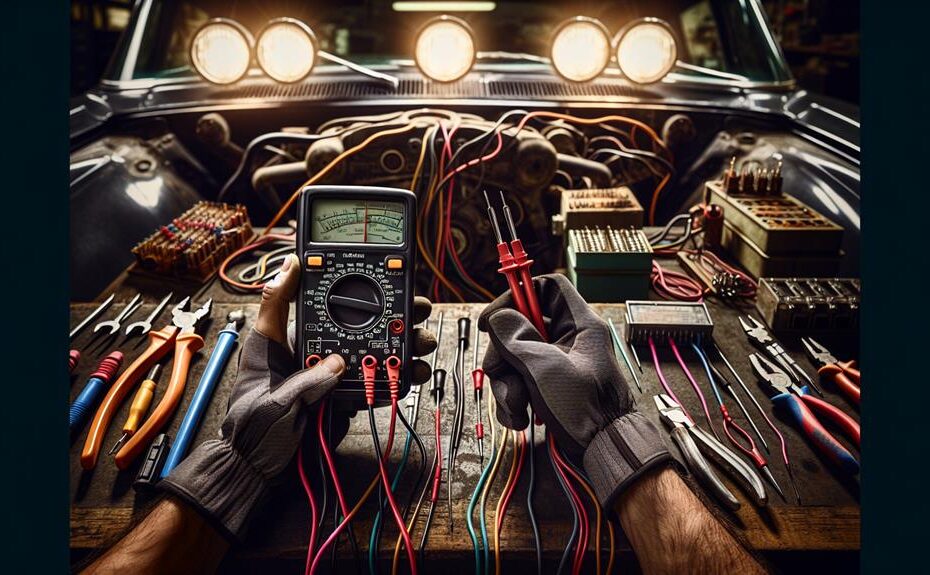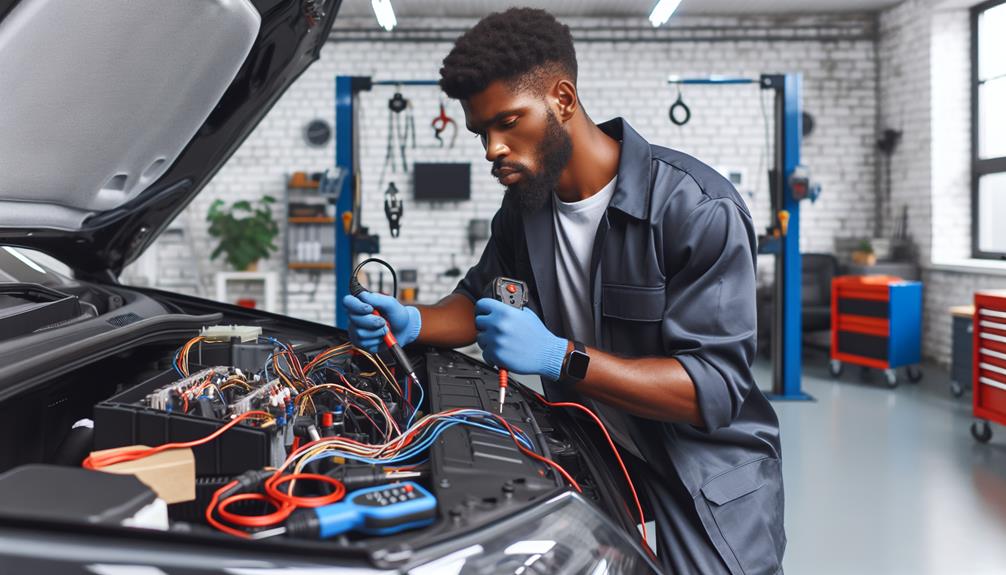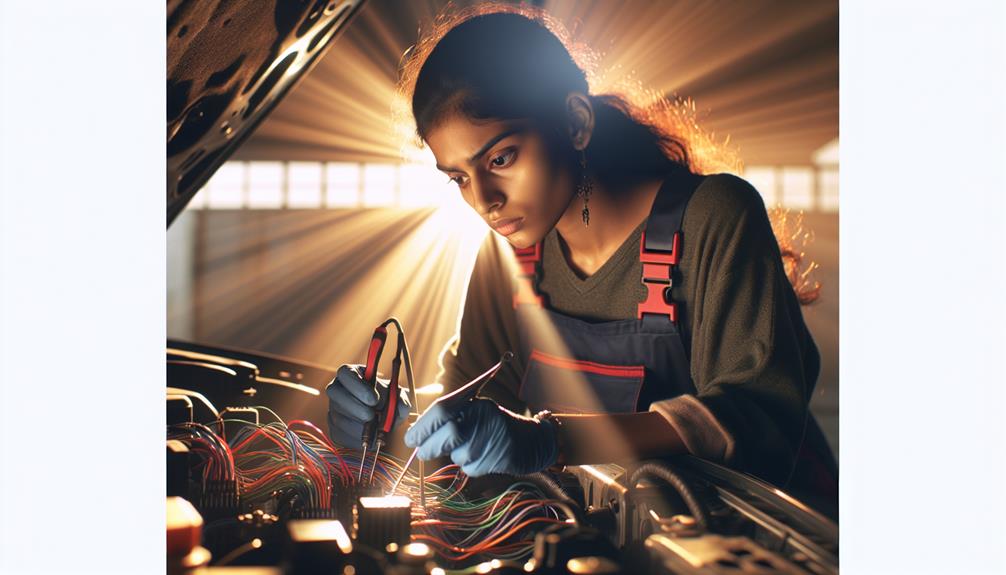Have you ever found yourself frustrated with a car that won't start or a malfunctioning electrical system? Well, here's something you may not know: many of these issues can be fixed on your own, saving you time and money.
Yes, that's right, with a little knowledge and the right tools, you can tackle your car's electrical problems yourself. But where do you start? How do you navigate the complex world of wires, fuses, and relays?
In this guide, we will unravel the mysteries of your car's electrical system and provide you with a step-by-step DIY approach to fix those pesky issues.
So, get ready to take control of your car's electrical woes and get back on the road in no time.
Key Takeaways
- Understanding the components of your car's electrical system is essential for diagnosing and fixing issues.
- Common electrical issues in cars include faulty wiring, dead batteries, and blown fuses.
- Having essential tools like a multimeter, wire strippers, and electrical tape is crucial for DIY electrical system repairs.
- Following a step-by-step troubleshooting process and taking safety precautions can help address electrical problems effectively and safely.
Understanding Your Car's Electrical System
To understand the electrical system of your car, it's important to familiarize yourself with its components and their functions. The car's wiring is the backbone of the electrical system, connecting all the electrical components together. It consists of a network of wires that carry electrical current from the battery to various parts of the car.
One of the key electrical components in your car is the battery. It provides the electrical power needed to start the engine and operates various electrical systems when the engine isn't running. The battery is connected to the alternator, which recharges it while the engine is running.
Another important component is the starter motor. It's responsible for cranking the engine and starting the combustion process. The starter motor receives electrical power from the battery and uses it to turn the engine's flywheel, initiating the engine's operation.
The alternator is another critical component that generates electrical power when the engine is running. It charges the battery and provides power to the electrical systems in the car. Without a functioning alternator, the battery would quickly drain, leaving the car without power.
Understanding the car's wiring and electrical components is essential for diagnosing and fixing electrical issues. By familiarizing yourself with these components, you can better understand how the electrical system works and troubleshoot any problems that may arise.
Common Electrical Issues in Cars
Now let's shift our focus to the common electrical issues that can arise in cars, as understanding these problems is crucial for troubleshooting and fixing any electrical malfunctions in your vehicle.
One of the most prevalent electrical issues in cars is faulty wiring. Over time, the insulation around the wires can wear off, leading to exposed wires that can cause short circuits or even fires. Symptoms of faulty wiring may include flickering lights, intermittent power loss, or blown fuses. To fix this issue, you'll need to locate the damaged wires and replace them with new ones, ensuring proper insulation.
Another common electrical problem is a dead battery. A dead battery can be caused by leaving the lights or other electrical components on when the engine is off, a faulty alternator that isn't charging the battery, or simply an old battery that needs to be replaced. To address this issue, you can jump-start the car using jumper cables and a working battery, or you can replace the dead battery with a new one.
Essential Tools for DIY Electrical System Repair
Equip yourself with the necessary tools to effectively repair the electrical system in your car. Having the right tools will ensure that you can properly diagnose and fix any issues with your car's electrical system components. Here are three essential tools that you should have in your DIY electrical system repair kit:
- Multimeter: A multimeter is a versatile tool that allows you to measure voltage, current, and resistance. It's crucial for troubleshooting electrical problems in your car. With a multimeter, you can test the continuity of wires, check voltage levels, and identify faulty components.
- Wire strippers: Proper wire connections are crucial for the electrical system to function correctly. Wire strippers allow you to remove the insulation from the wires without damaging them. This ensures a clean and secure connection, reducing the risk of short circuits or loose connections.
- Electrical tape: Electrical tape is a must-have for any electrical repair job. It provides insulation and protection to exposed wires, preventing them from coming into contact with other components or metal surfaces. Make sure to use high-quality electrical tape that's resistant to heat, moisture, and corrosion.
Step-by-Step Guide to Troubleshooting Electrical Problems
Having the right tools is essential, but knowing how to effectively troubleshoot electrical problems in your car is equally important. When faced with an electrical issue, the first step is to diagnose faulty wiring. Start by visually inspecting the wiring harness for any signs of damage, such as frayed or melted wires. Use a multimeter to test the continuity of the wires, ensuring that there are no breaks or shorts. If a faulty wire is found, it should be repaired or replaced.
Next, it's important to test the electrical components that may be causing the problem. Begin by checking the fuses and relays, as these are common culprits for electrical failures. Use a fuse tester to determine if a fuse is blown and replace it if necessary. Proceed to test the switches and connectors, ensuring that they're functioning correctly.
If the issue persists, it may be necessary to test the battery and alternator. Use a battery tester to measure the voltage and ensure that it's within the recommended range. Additionally, check the alternator output using a voltmeter. If either of these components are faulty, they should be replaced.
Safety Precautions for DIY Electrical System Repair
To ensure your safety while repairing the electrical system of your car, it's important to follow a set of safety precautions. Working with car electrical systems can be complex and potentially dangerous if not done correctly. Here are three important safety measures to keep in mind:
- Importance of professional help: It's recommended to seek professional assistance for any major electrical repairs. Car electrical systems are intricate and require specialized knowledge and tools. Professionals have the expertise to identify and fix issues safely and efficiently, minimizing the risks involved.
- Potential risks involved: DIY electrical system repair can expose you to various hazards, such as electrical shocks, short circuits, and even fires. One mistake can result in severe damage to your vehicle or personal injury. It's crucial to understand the potential risks and take necessary precautions to protect yourself and your car.
- Safety equipment and precautions: Always wear insulated gloves and safety goggles when working on your car's electrical system. Disconnect the car battery before starting any repairs to avoid electric shocks. Use proper tools and ensure that all connections are secure and insulated to prevent short circuits or sparks.
Frequently Asked Questions
Can I Fix My Car's Electrical System if I Have No Prior Experience With Car Repairs?
You can fix your car's electrical system without prior experience, but it's important to be cautious. Common mistakes beginners make in DIY electrical repairs include not properly disconnecting the battery and not using the right tools.
How Long Does It Usually Take to Troubleshoot and Fix an Electrical Problem in a Car?
On average, it takes a few hours to troubleshoot and fix car electrical problems. To be efficient, gather information about the issue beforehand, use diagnostic tools, and follow a systematic approach to identify and resolve the problem.
Are There Any Common Mistakes That Beginners Make When Attempting DIY Electrical System Repairs?
When attempting DIY electrical system repairs, beginners often make common mistakes. It is important to follow troubleshooting tips and avoid errors such as incorrect wiring connections or neglecting to disconnect the battery.
Can I Use Regular Household Electrical Tools for Repairing My Car's Electrical System?
Yes, you can use regular household electrical tools for repairing your car's electrical system. However, it is important to take safety precautions and ensure that you have the necessary knowledge and skills to do so effectively.
Is It Safe to Work on My Car's Electrical System if I Don't Have a Lot of Knowledge About Electrical Systems?
You don't need to be an expert to work on your car's electrical system, but it's important to prioritize safety. Take precautions, use proper tools, and consult resources to ensure you're working within your knowledge limits.
Conclusion
In conclusion, fixing your car's electrical system can be a challenging task, but with the right tools and knowledge, you can successfully troubleshoot and solve common electrical issues.
By understanding your car's electrical system and following safety precautions, you can save time and money by performing DIY repairs.
So, why wait for a professional when you can take control and become your own car electrician?



